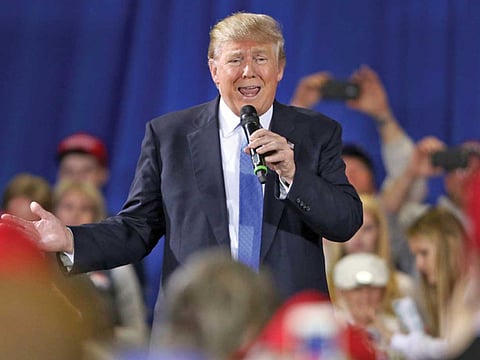Why Trump is a very un-American strongman
A whole class of pundits has been caught unawares by the revolt of the American masses

US politics today presents, to this foreign observer at least, a very un-American spectacle. A country originally built on immigration is awash with popular hatred against immigrants. A candidate of the right rails against free trade and foreigners, while that of the left proclaims his faith in socialism. Xenophobia is rife. Class war seems perilously close to the surface.
The US has gone through economic slumps and protectionist phases in the past. But the New World has been relatively immune to the political dysfunction, class and ethnic hatreds, and mass craving for authoritarianism that have frequently been manifest in the Old. Today, more than at any other time in its history, the crisis in the US resembles one that we’ve seen innumerable times in Europe and Russia.
The demographic data that correlate support for Donald Trump to middle-aged whites, who are suffering dramatically rising death rates, remind one of the economic devastation (and sudden spike in mortality rates) in Russia that helped lift President Vladimir Putin to power. The sweeping hatred of metropolitan elites evokes the “politics of cultural despair” — the title of Fritz Stern’s classic account of the rise of nativist passions in 19th century Germany. The explosion of trash talk on the campaign trail recalls Ortega y Gasset’s warning in The Revolt of the Masses (1930) against a “raving, frenetic, exorbitant politics that claims to replace all knowledge”.
A whole class of pundits has been caught unawares by the revolt of the American masses. Mea culpas now come fast from the truly chastened. The unrepentant, on the other hand, have chosen to declare war on the rebellious masses. A writer in the National Review charges that “the white American underclass is in thrall to a vicious, selfish culture whose main products are misery and used heroin needles”. His own suggested therapy is “U-Haul,” or migration to the parts of the country where US-style opportunity is still bountiful.
The inhabitants of de-industrialised towns are likely to see such a panacea as more proof that metropolitan elites are intolerably snooty. In any case, human labour, rooted in region and family, cannot be as mobile or flexible as global capital. Distressed beyond a point, working populations have been known historically to lash out at all those — bankers, economic liberals, cosmopolitan intellectuals — who seem indifferent to their plight.
Trump seems to have grasped this better than the pundits as he accuses China of stealing US jobs, and trumpets a nativism built around lost American glory and grandeur. And for all his talk of reconstituting US exceptionalism, Trump’s proposed solution has a clear European pedigree. The problem itself dates to the earliest days of what Adam Smith called the commercial society: essentially, a society built around modern trade and finance, and grounded in property rights.
From the beginning, theorists and policymakers found it hard to strike a balance between the freedom and dignity of property-owning citizens, and the inevitable inequalities created by an internationally competitive commercial society that requires a complex division of labour.
Economic nationalism
Attempts to square this circle in Europe produced the seductive recipes for economic nationalism that some US politicians are now vending. Take, for example, the apparently oxymoronic title of the book The Closed Commercial State (1800), by Johann Gottlieb Fichte, one of the most influential German thinkers of the modern era.
According to Fichte, the state should act to prevent the insecurities of modern economic life from cramping the liberty and autonomy of property-owning individuals. He argued that the state should be a radically monetarist one and guarantee a right to work. But this in turn depended on closing the economy off from international competition and interdependence. Fichte then went on to theorise an us-versus-them nationalism, which contained plenty of animus against foreigners. It’s easy for us to dismiss Fichte as a forerunner of xenophobic continental ideologies that were eventually vanquished by the Anglo-American liberal empire of free trade. But, in a 1933 article entitled National Self-Sufficiency, no less than John Maynard Keynes argued that “let goods be homespun” and “let finance be primarily national.” He feared that an excess of economic interdependence was “likely or certain in the long run to set up strains and enmities which will bring to nought the financial calculation.”
The popular hatred of globalisation in general and China, immigrants and foreigners in particular shows that those strains and enmities have indeed triumphed over financial calculation — even in America. The US could avoid them only so long as the benefits from globalisation appeared to be trickling down. The shattering of that illusion has brought forth European-style class conflict and ignited a distinctively un-American passion on both the left and the right against free trade and for economic nationalism. This is why Trump ought to be seen as a European radical in disguise, blithely shredding rather than reconstructing the claims of American exceptionalism.
— Bloomberg
Pankaj Mishra is a Bloomberg View columnist, author and commentator. He is the author of From the Ruins of Empire: The Intellectuals Who Remade Asia.



